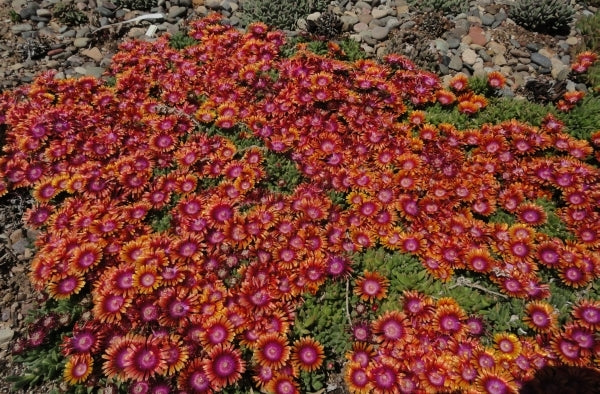Delosperma 'Fire Spinner'
Fire Spinner Perennial Ice Plant
Item #: 9675
Zones: 5a to 8b, at least
Dormancy: Evergreen
Height: 2" tall
Origin: South Africa
Pot Size: 3.5" pot (24 fl. oz/0.7 L)
(aka: Delosperma P0015 - an illegitimate cultivar name) It's a truly rare occasion when a new plant gets you so excited that you jump out of your chair and dance around like an NFL receiver scoring his first touchdown. Well, such a plant is Delosperma 'Fire Spinner'. This amazing, still unnamed delosperma species was discovered in the wilds of South Africa's East Cape at 6,000'+ near Tarkastad and brought to this country thanks to our friend and delosperma guru Panayoti Kelaidis of the Denver Botanic Garden. The groundcover mats of fleshy evergreen foliage spread to 2' in 2 years and are topped much of late spring and into early summer with eye-like upturned flowers composed of bright orange petals that morph to magenta at the base with a central white eye highlight...this is neon-quality tacky on steroids. You're sure to brighten up your rock garden with this 2012 Plant Select Winner. If you live in a HOA-ruled neighborhood, good luck getting approval to plant this.
Maintenance:
This superb selection is a maintenance free groundcover that requires nothing more than keeping it from overtaking other dwarf plants that are growing nearby.
Growing Conditions:
Like all ice plants, it needs full sun and exceptional drainage, particularly in summer and winter. We recommend the incorporation of a small-size gravel into the top 6" to create an ideal root zone. It also needs a cold winter to set good flower buds, so flowering will be sparse in regions with a lack of adequate winter chill, although the plants will grow fine.
Garden Value:
When grown in the proper conditions, Fire Spinner ice plant makes a dense evergreen, weed-surpressing groundcover. Few plants this showy can survive hot, dry sun as well as this.
Natural Impacts:
Honeybees are one of the primary pollinators for ice plants, but not to worry, since while they are feeding, honeybees have no interest in humans.

-
Related Articles
-
Other Attributes
Genus: Delosperma
Flower Color: Multicolor , Orange/Peach
Container Role: Spillers
Garden Themes: Fairy Garden Plants , Gnome Gardens , Green Roofs , Living Wall , Rock Garden Plants , Southwest Garden Plants
Other: Butterfly Attracting Plants , Drought Tolerant Plants , Dwarf Plants , Groundcovers , Hallucinogenic Plants , Pollinator Plants , Medicinal Plants , Rabbit Resistant Plants , Salt Tolerant Seaside Plants , Xeriscaping Plants


